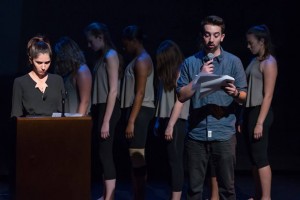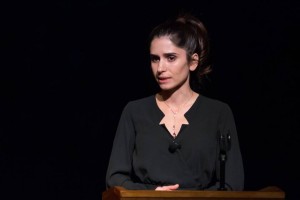- Apply
- Visit
- Request Info
- Give
Published on December 07, 2016
Polisci student Sabina Mamedova share her life experiences as part of the Immigrant Project at the Democracy at Work series at Eastern

The Democracy at Work series at Eastern included political views, artistic talents and information before the presidential election. There were a variety of events such as drawing cartoons about candidates, lectures and debates, and even students dressed in candidate costumes. As a political refugee it was not hard for me to share my story for the Immigrant Project because of my experiences in Russia and being deported to the United States without speaking any English. My advantage in a major project like this was that I am a theater major while also studying politics. Before the event I already had a memoir, which was turned into a script and play informally called "The Sabina Project". The play involved Syrian refugees' stories and crises, which brings awareness about them and asks what are we doing to stop these crises and how are we helping. I was deported twice and am the grandchild of refugee survivors, their stories started during World War II when Stalin uprooted them from their land. My great-grandparents did not know any country but Georgia, however, they were exiled just because they practiced a different religion and belonged to a different ethnic group than that of the majority of people living in Georgia.
The narrative of the Sabina Project starts on November 14, 1944, when Stalin exiled the Ahiskan or Meskhetian Turks from Georgia due to ethnic cleansing and religious persecution, under the excuse that my people were collaborating with the Nazis. My people were exiled into five different countries: Uzbekistan, Kazakhstan, Kirgizstan, Siberia and Turkey. The cold journey continued for several weeks causing people to die in freezing temperatures. My great-grandparents died as soon as they arrived in Uzbekistan where I was born. Most healthy men were sent to serve the Soviet army and, when some returned, they could not find their exiled families. Some families were not reunited until 1956, more precisely after Stalin's death. In 1989, my people were deported from Uzbekistan to Russia due to ethnic cleansing. In 2005, my people were deported again due to ethnic cleansing and religious discrimination in Russia to the United States. So the play starts with an introduction of my journey and expands to a narration of the Syrian refugee crisis. It explains how the Syrian civil war started from small riots and soon became a great catastrophe.

In the play, five different narrators read the historical parts of my memoir and blend with the story of journalists' experiences about the Syrian civil war and the refugees leaving the country while hoping to survive. Through the play, dancers interpret the ongoing narration and their movements relate to my story and to that of many Syrians. The group had the guidance of Professor David Pellegrini of the Department of Performing Arts. There is also music that creates an appropriate atmosphere while the narrators and performers are on stage. Part of the play also includes videos of me being interviewed on sensitive subjects about my life in Russia. Overall, the play blends art and my personal history as a refugee.
Written by Sabina Mamedova

